FETISHIZATOR
August 2008

Executive brief:
What is
Fetishizator?
Why do I
write about the kindergarden electronics ?
How does
lampizator compare to fetishizator?
I/U (wrongly
called I/V) conversion of TDA1541A DAC signal
Have I finally
found the Holy Grail of CD world? Am I close ?
I AM DAMN CLOSE !
J-FET is a specific kind of low power field effect transistor hence my
nick-name FET-ishizator. It is a bastard son of Lampizator.
Fetishizator
is the World First fully transistor
Lampizator.
As far as Lampizators go, noone before dared to push the boundaries of
technology so far. Nobody went more close towards musical truth and
engineering honesty. I am exploring the terra incognita. I am
travelling alone to the dark side of the moon.
THE BIG QUESTION, which was bugging me ever since I opened the first CD
and lost my DIY virginity, I was asking myself: why in the world all
players use op-amps, some of them use tubes, but nobody uses
TRANSISTORS ?????????????
A transistor seems to be a fairly innocent and transparent piece of
silicon. It is no good for amps because it must pass many amperes, and
tubes deliver high energy faster, but to amplify the 2 V signal of DAC
- should be relatively easy.
Eventually I found in the Copland CD a nice discrete stage, quite
complex to be honest but nevertheless great sounding. It was bettered
by Lampizator though. MARANTZ CD players have the famous HDAM
(high
definition analog module) which I immediately opened because it was
concealed.
A quotation from my Marantz CD67 article elsewhere:
The
output
stage is original - Marantz TOP OF THE LINE HDAM to be found in all top
players all the way to 8 000 Euro.
What is HDAM I
really don't know. it is something MYSTERIOUS that is so cool they had
to hide it inside shiny cans.
They hide it - I open - sez I.
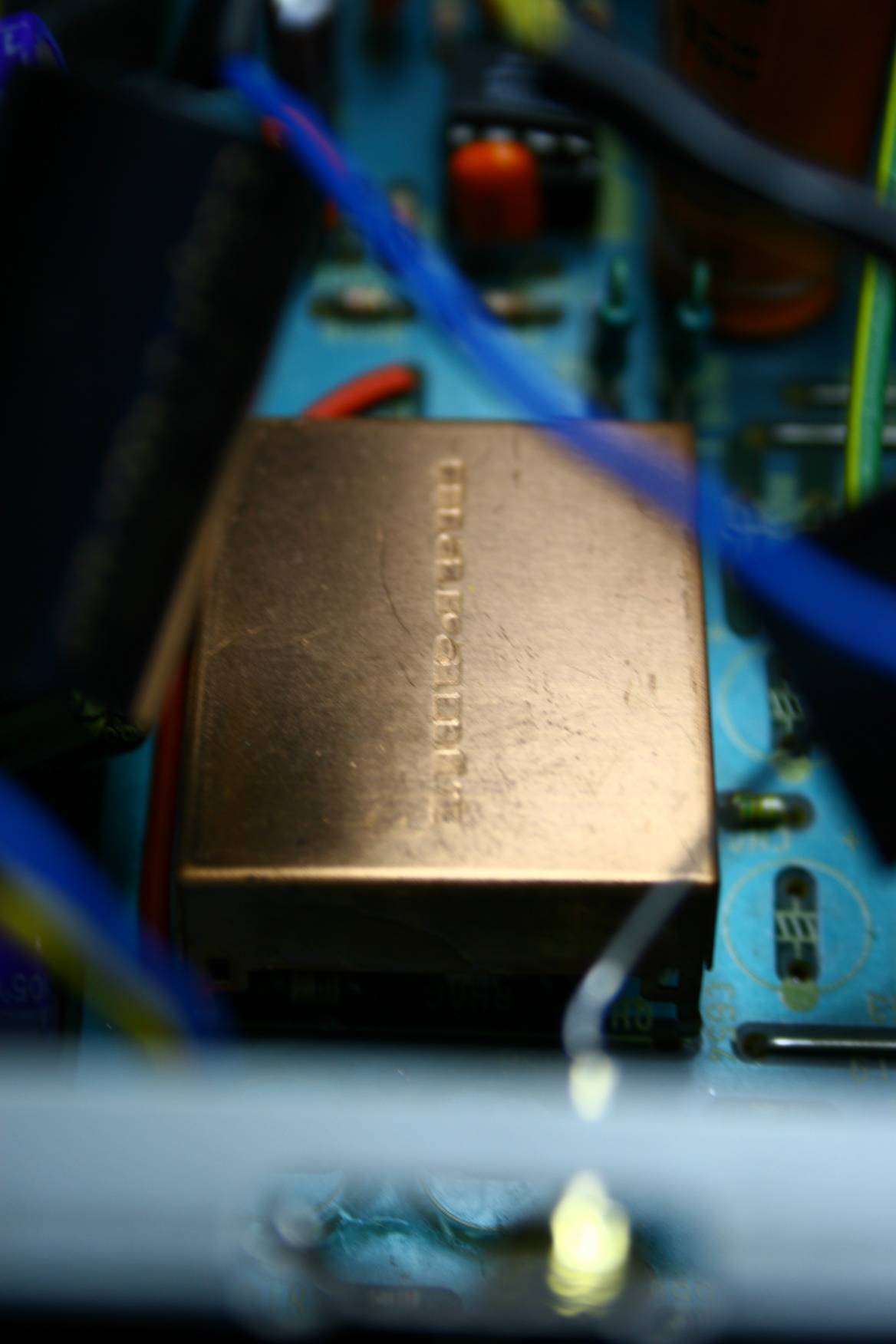
tadadadadadadadadadada drums rolling ...........
open kimono time !!!!
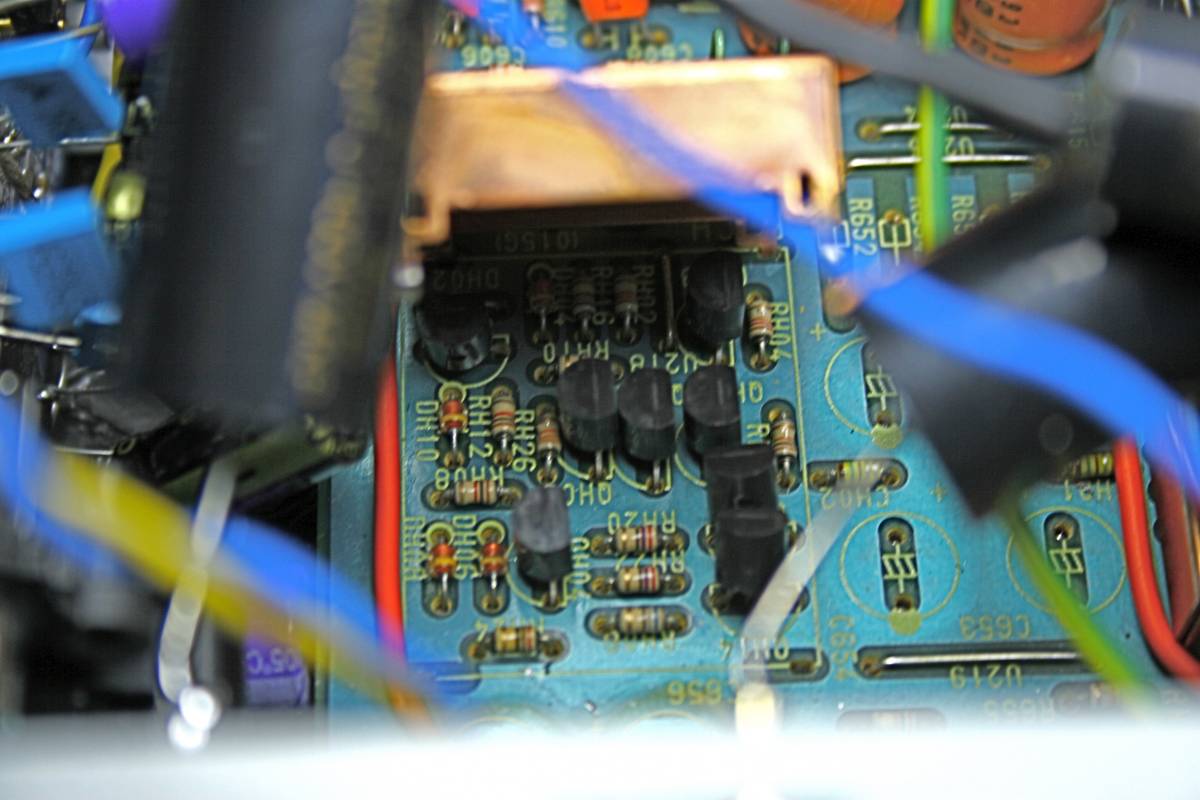
So the HDAM is an amplification stage consisting of 8 discrete
transistors and 12 resistors and 5 diodes PER CHANNEL.
Very nice of Marantz to use discrete components not op-amps, hats off
to them, but calling it a revolutionary proprietary high definition
stage - is a BIT OF OVERSTATEMENT. Too much marketing BS for my
taste.
To make things even worse - they still have one opamp per channel after
DAC. And to make things EVEN WORSE THAN THAT - they have V out DAC type
which requires neither conversion nor amplification, just a
buffer. Such output stage was an order of the day back in the
times before
opamps. Every kid in 1970 could do a stage like this on their first
semester of electronics. So I do not consider it such a big deal.
Ken Ishiwata "invented " transistors in the same way I "invented "
tubes.
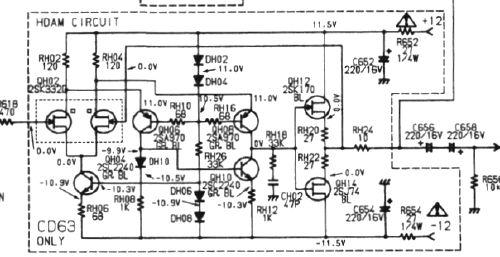
I should patent SNIPIT and cover NOTHING - (air) - in the golden can
and call it High Transparency Output Stage - HTOS.
Back to
Fetishizator
As much as I liked
the HDAM, (say in Marantz 7) I felt that they have overdone it.
If not HDAM, and not op-amp - what else can we do ?
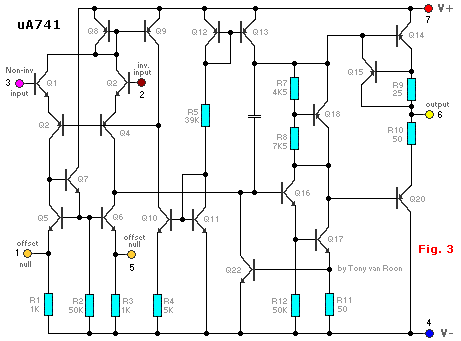
This schematics above is just for your reference - op-amp
equivalent schematics.
Since I can't design transistors, I turned to the person of wisdom and
experience: Mr Dietmar from Austria. He said that he feels a j-fet
should do the job : shooting two birds in one shot: I/U conversion for
TDA1541 and providing signal amplification. Just ONE transistor
replacing 27 transistors in average in an op-amp.
I took
Dietmar's design, and I suspected it was again overdone for my taste.
His schematics called for 4 amplification stages in series plus analog
filter network. I do not show original design because I went a
different way.
As an
experiment I built what Dietmar proposed and I listened to it for an
hour - just two stages - Jfet SE amplifier and after - a FET buffer.
Later - I built my own unauthorized variation - just one transistor.
MY BIG THANK YOU Mr. Dietmar , YOU ARE SO KIND.
One single ended
pure class A zero feedback amplifier with field effect transistor
(which behaves almost like a triode because the control pin - GATE -
has high impedance. It does not consume current to drive the
transistor. Gate behaves like a grid.
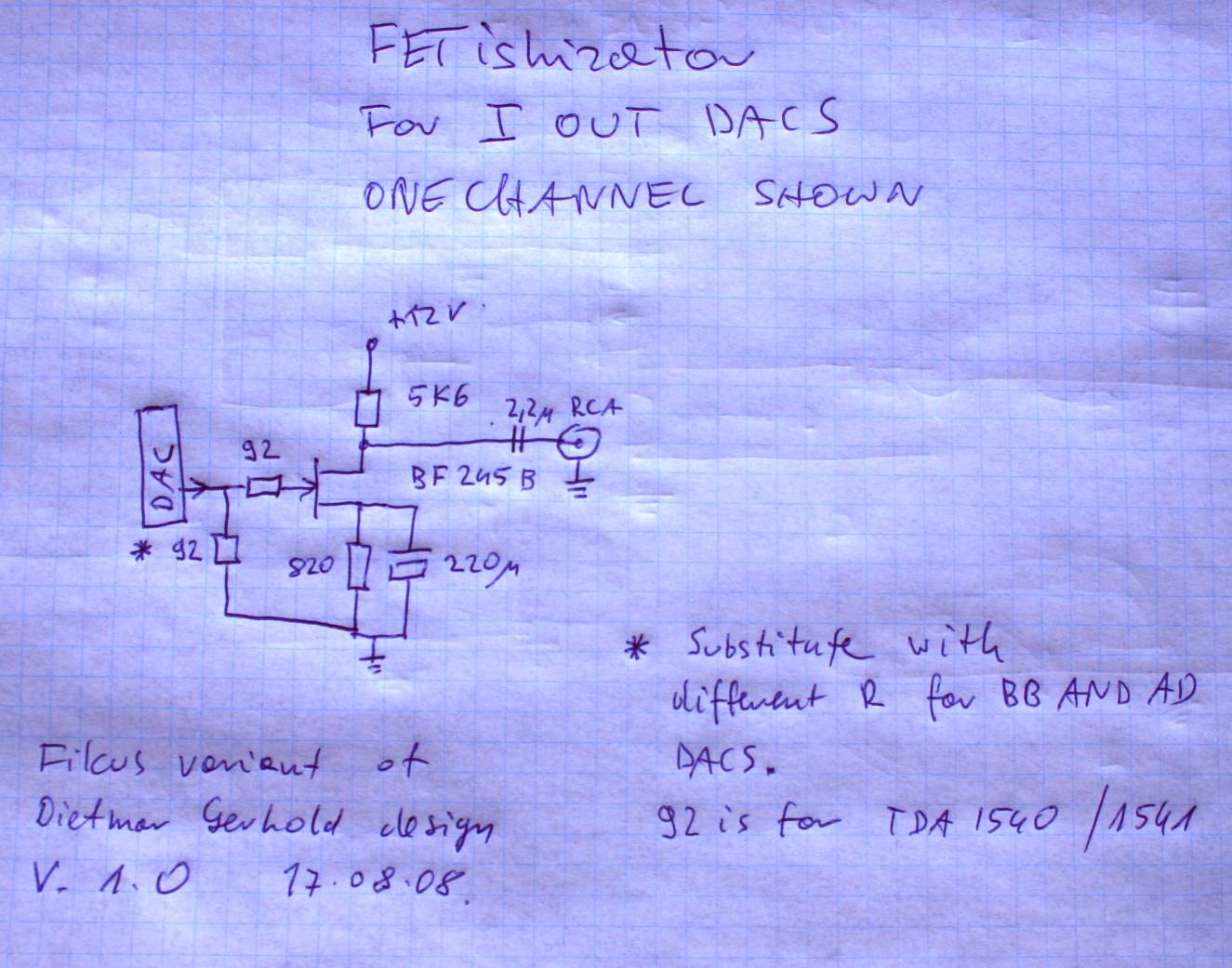
CORRECTION: the j-fet on the schematics is really the "A" type.
For the B - use 2k7 resistors in cathoides (ooops - in SOURCE)
I applied it to
my best DAC - the TUBE-SATCH. I used TDA1541a/S1 dac
and I took the supply from SATCH unused (well made indeed) supply block
for the opamps - the 15 V DC.
I made special
plugs so I can switch Lampizator and Fetishizator in 10
seconds.
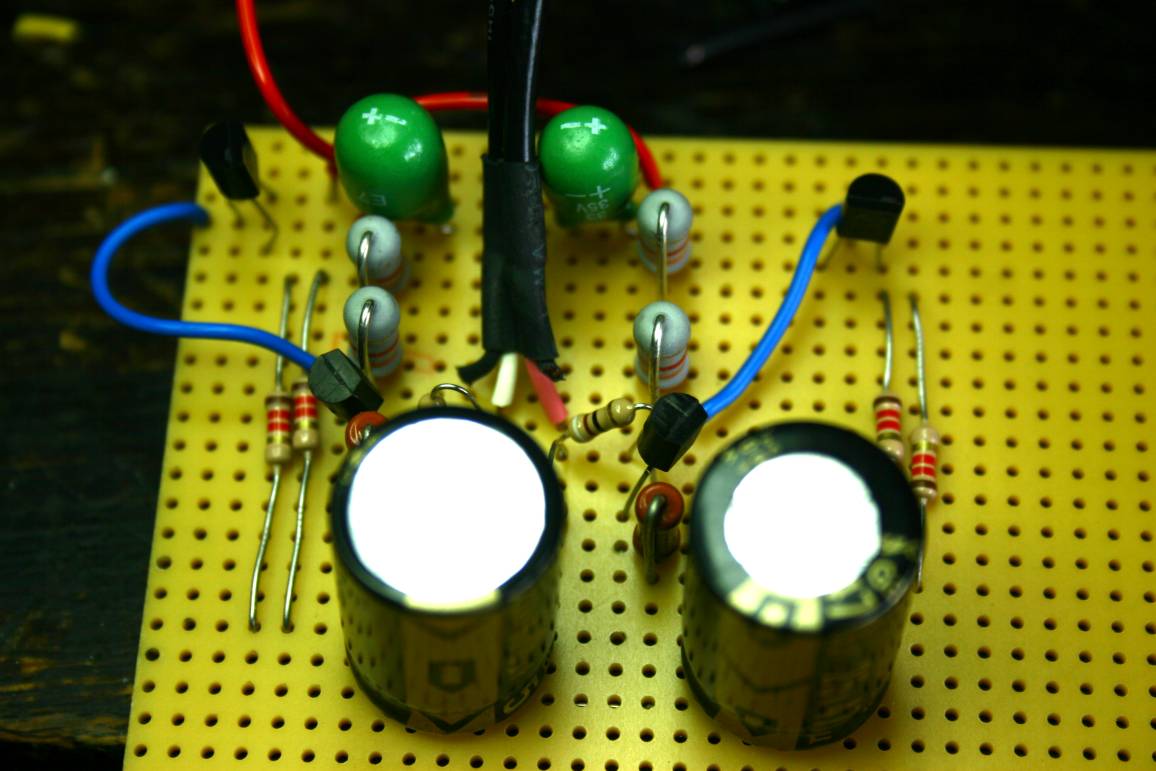
The above
prototype has two stages as per Dietmar's prescription, but
only a half of it is used. I skipped the MOSFET buffer which was
lowering just the output impedance.
The horror
begins.
I spent whole
night comparing my favourite discs and the bloody
Fetishizator is so close to Lampizator that it totally scares me. One
was winning, and another taking the lead many many times, like in
today's volleyball game Poland Russia. When on jazz, pop, rock and
fusion pieces the result was an equalizer, there was one area where the
Fetishizator had a clear upper hand - that was
...........................................................................
human voices. The transparent clarity and naturalness was absolutely
mind-blowing.
The quality of
TDA1541A was shining like never before. Naturally, the
bass, especially lowest - was phenomenal as well. Space, 3-d, details,
everything I can name is great.
This leaves me
speechless. How is it possible?
And especially
WHY NOBODY DID IT BEFORE? At least I haven't seen it done
this way.
Overall, on a
second day I decided I am staying with 6N2P tube stage
because it sounds better to me as a whole, especially the rhythm and
pace
and energy is better by a small margin, but the call is very
close. I could live with the transistor.
For people who
hate tubes or for those who do not appreciate them - the
Fetishizator is an ideal choice.
After a week, I took the DAC to the friends house and tried it in a
VERY sophisticated 70 000 Euro system and then I heard clearly that the
6n2P tubeis better without a doubt but J-FET sounds VERY nice indeed.
Probably a better choice of transistor, operating point and supply
voltage - j-fet would sound even better. My prototype Fetishizator is a
first beta version I ever tried.
Fetishizator
Discrete Output Stage for I out DAC types.
All current
output DACS like TDA1540, TDA1541, TDA1541A, Burr
Brown PCM63, PCM58, PCM1702, PCM1704, PCM1794, and Analog Devices
AD1862 and many more - should benefit greatly from substitution
of the typical op-amp with the Fetishizator. The difference between FET
and tube is a question of taste and preferences, but Fetishizator
against op-amp this is a knockout.
Benefits of using
Fetishizator:
- Sounds great
- It is a pure, simple, kosher device, just ONE active part
between the DAC and the amp !
- Uses available 12 V DC as supply, no need for additional
transformer with 160 V DC supplies.
- Does not require heaters
- consumes small power
- fits in tight spaces
- costs nothing (I paid for mine 2 Euro)
- runs cold
- does not require endless rolling of various NOS models of FET.
Down sides of
Fetishizator
- it is not cool to have, no pride of ownership
- sounds a touch sterile
- it takes longer to build. in my case - 4 x longer.
Not much of a
downside, is it ?
After some
thinking I decided to propose a new device: The world first
opamp substitution Fetishizator - a funny way of mounting the
Fetishizator on the opamp SOCKET to make it a 1:1 replacement for
opamps in i/U conversion applications which is the FIRST opamp after
the DAC chip.
OP-AMP
Fetishizator a'la Fikus
In 95% of
players, the first opamp after the DAC will be a double
op-amp like 5532.
What we do,
- we remove the opamp,
- float the leg 1 (output) to isolate the feedback circuit (R and C
from input to output)
- solder the new socket in place of opamp
- build the Fetishizator on the second socket
- plug the fetishizator in
- Install new solid RCA's
- wire the pin 1 to the RCA, mount the CAPACITORS (like a 2,2 uF
MKP) directly on the RCA's.
- Wire the RCA ground to the PCB ground
- upgrade the capacitor supplying the leg 8 with 12 V DC with a
better one like Blackgate, Tantalum or Oscon.
- Voila - It should work.
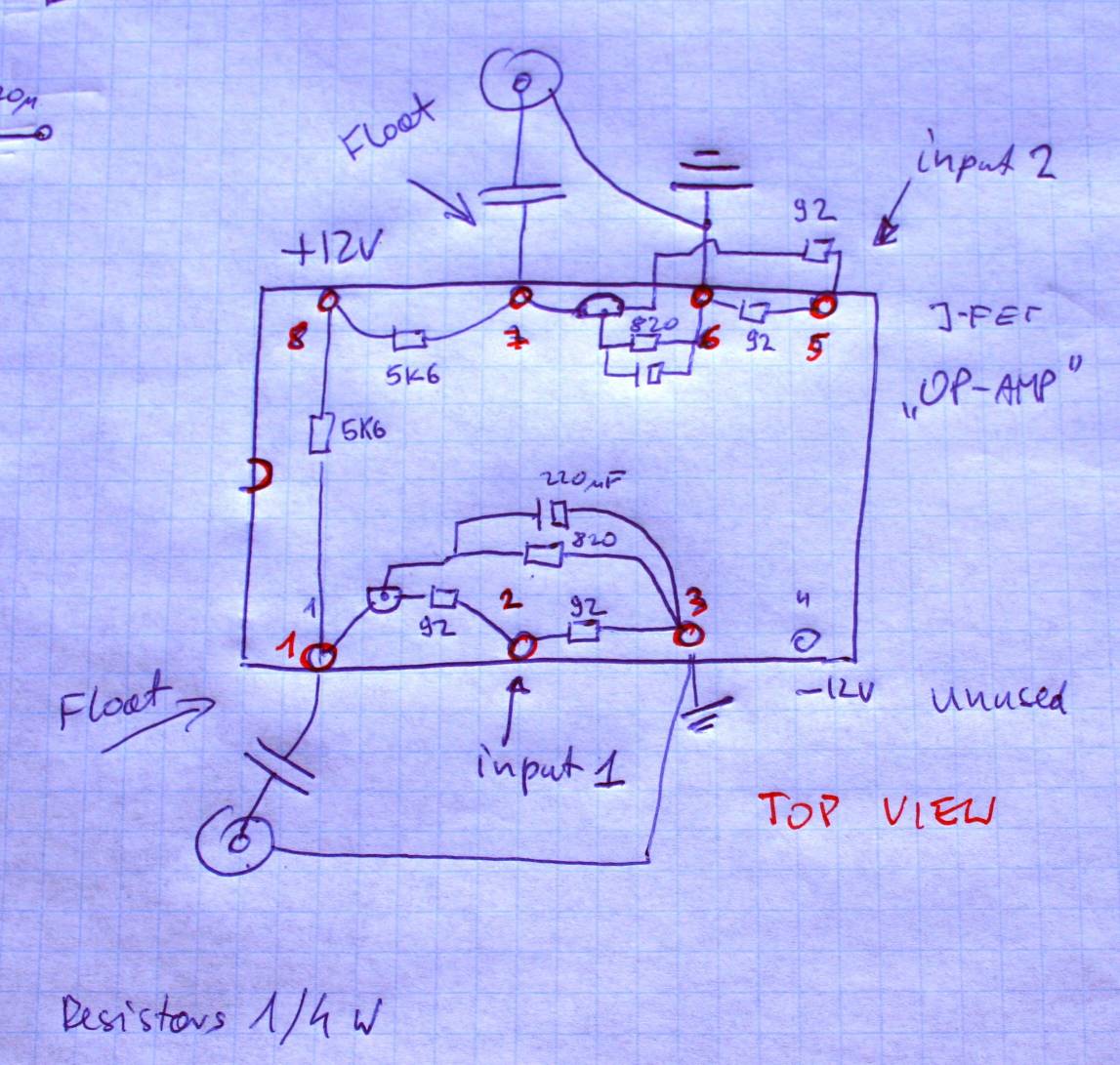
The J-FET is A type here. For B type - use 2k7 resistors instead of 820
Ohms.
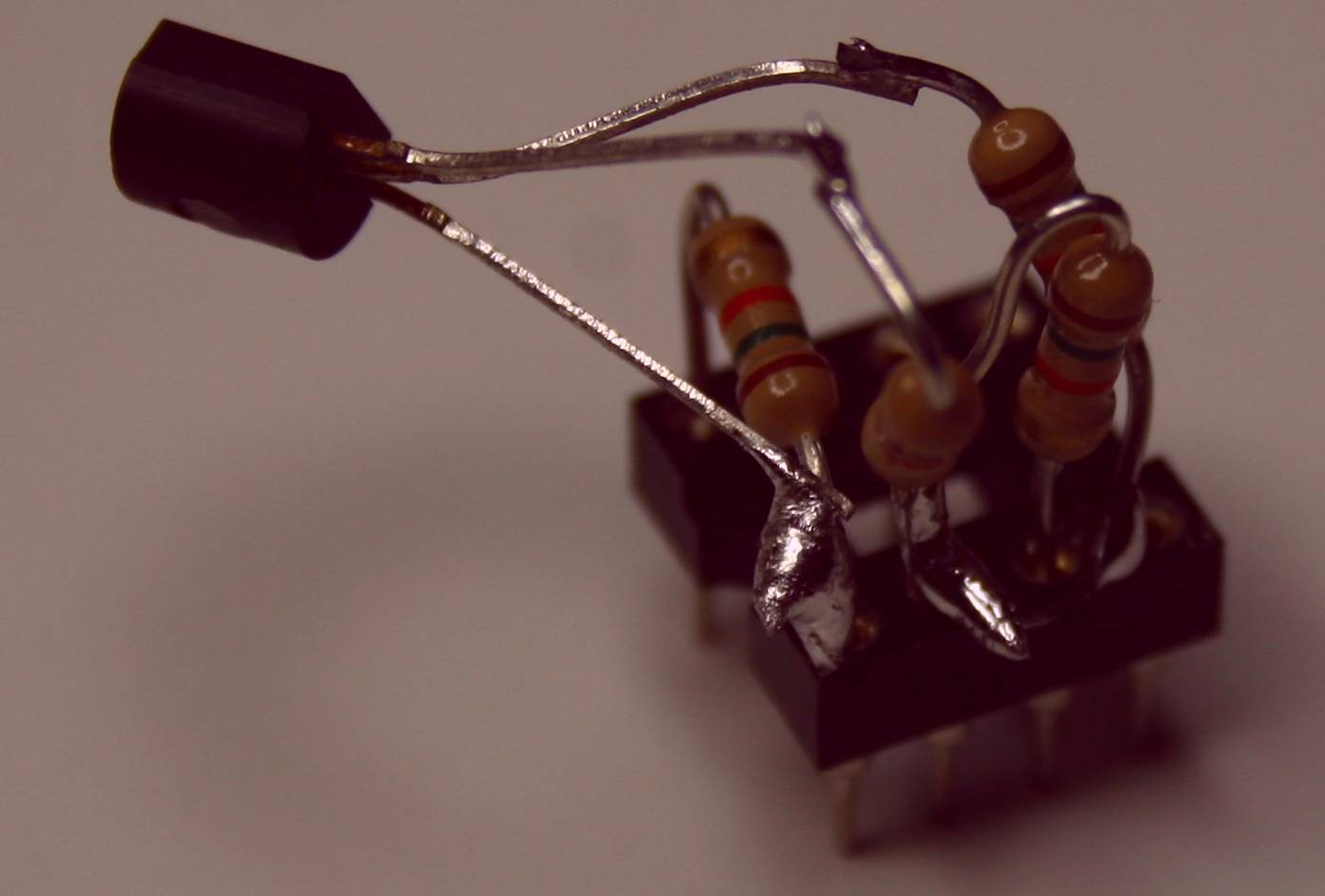
This is the opamp base version of fetishizator - quick and dirty
version without attention to neat soldering.
For the single
opamps - like BB OPA-604 or AD825 - build a modified
version.
If the DAC is
wired to the second opamp inside the double unit
(pins 6 input, 7 output) - adapt the schematics accordingly. Some
designers do so because the second half of opamp is easier to wire
depending on PCB layout.
On my drawing I
have both sides populated, but usually one double opamp
serves one channel so you build a half of fetishizator only, one half
per channel.
If you don't
trust the existing power supply to the 12V pin (pin 8) (it
may be contaminated with noise from clock, from DAC, from motors) you
can float pin 8 and build your own supply of 12 V DC (or 15 V DC). That
is probably a good thing to do.
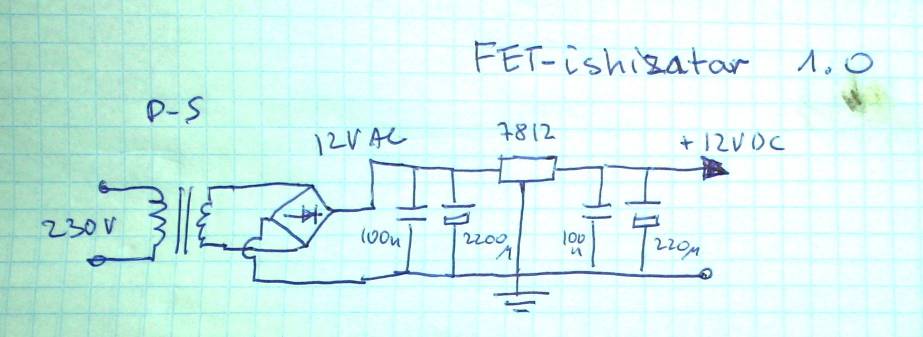
A
DISCLAIMER: Users of transistor amps may be careful because the FET is
transparent up to 700 MHz so it will amplify the inaudible noises which
may upset your amps. I do not see a problem in my vintage system but
your mileage may vary. Especially that if we use NOS mode and no analog
filtering at all - noises may creep inaudibly.
A small note
on me going "full circle"
Some readers who followed my other projects may be surprized, or even
puzzled by the fact that Doctor Lampizator llikes the transistor. Some
people may think that it is a joke.
Well, so what ?
Tubes are not a religion. Not for me. Tubes are not a dogma. I always
claimed, that I like them as long as they do provide sonic edge. I
could not care less if my best sounding device is a tube, a transistor,
an op-amp, parrot guano or gaslight. Or Pentium processor.
I am looking for simple and elegant ways of achieving my target -
uncompromised sound.
I insist - uncompromised -
without any limitation to low price, diy, budget or things like
that. If money could get me sound, I would take a second job and save
money for the Mark Levinson CD. But the key to pereformance is
simplicity. Both tubes and transistor like J-Fet allow for ultimate
simplicity - one acive device between I Out dac and amplifier.
So do not get me wrong - I am NOT CONVERTED to NORMAL CD players
without tubes.
The J-FET is actually a STEP FURTHER - one step deeper into the world
of simplicity occupied by tubes. I have to refine the circuit to match
the tube quality, this one is not equal
to best SRPP tubes.
At the same time - the J-FET experiment answered my question why nobody
has done it before in HIFI gear?
Such a simple answer: FETISHIZATOR including a high end power
supply costs 2 Euro 25 cents (stereo) with premium parts. So even
after adding mohogany cheeks it is hard to justify a high price tag to
the CD player.
I am planning many interesting
experiments with the Fetishizator, and of course I will publish the
results.
THE LATEST AND
BEST design of Fetishizator 2,0 by Mr. Dietmar from Austria
(DOWNLOAD PDF) - he
really tested it well and it is supposedly the ultimate Fet stage for I
OUT DACS.
I have not yet formed my opinion about it so I publish it as Dietmars
own proposal. I will try it asap. By clicking on the above link you
will download PDF file with all info necessary to create fetishizator.
File is over 500K in size.
Below I publish for quick reference the schematics from the PDF file.
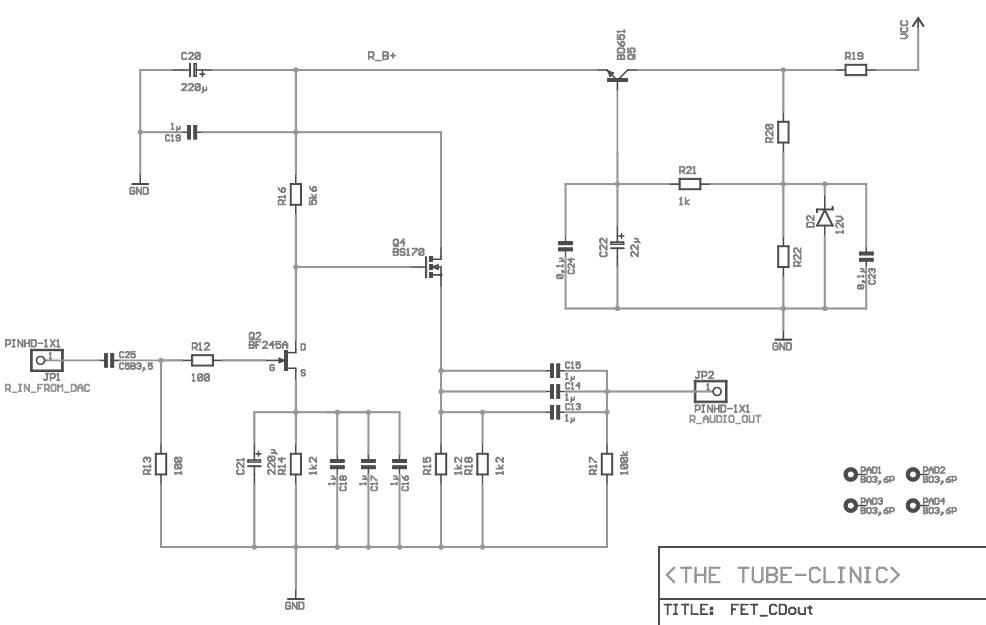
Please note the TRIPLE caps are just bypasses to achieve beter timbres.
You can use one cap if you want. At least to start. All cap values can
vary significantly, especially up.
Meanwhile I
remain,
Yours truly
- Doctor Lampizator in the state of Bliss.
Parts for this project
BACK








